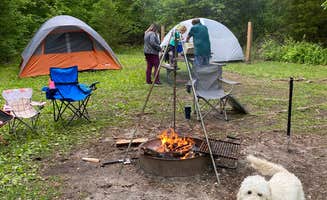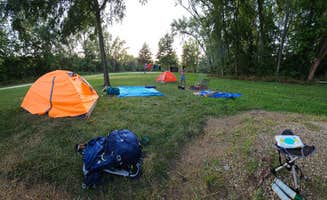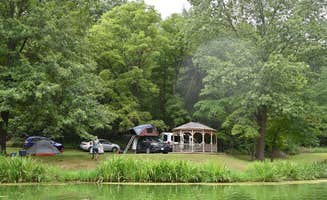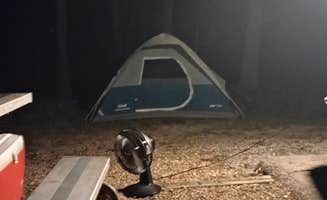Tent camping near New Melle, Missouri offers several options within a 30-mile radius, with elevations ranging from 500 to 800 feet above sea level in the rolling foothills of the Ozark Mountains. The region experiences hot summers with average July temperatures around 88°F and frequent afternoon thunderstorms, while spring and fall bring milder conditions ideal for overnight stays. Summer humidity levels often exceed 80%, making proper ventilation essential for comfortable tent sleeping.
What to do
Hiking technical trails: Little Lost Creek Conservation Area provides challenging terrain with significant elevation changes. "There is a great hike down into a valley with the actual Lost Creek at the bottom, completely worth the hard hike back up out of the valley," notes Annie C. about this free primitive camping location.
Mountain biking: Klondike Park features several technical mountain bike sections within the park boundaries. "One other really cool thing about Klondike is there are several technical mountain bike sections that are located in the park. Bring your mountain bike and have a go!" says Megan K.
Float trips: Float excursions on the Meramec River are available through Old Cove, which offers 4-mile and 9-mile float options. According to Mara F., "For float trips they pick you up from your campsite and bus you to your put in point. You can float the Meramec for 4 or 9 miles and you end back at the campsite."
Fishing: William R. Logan Conservation Area includes stocked lakes with primitive camping nearby. "Free primitive campground near a lake in William Logan," mentions Annie C., though she notes the shooting range in the conservation area can be noisy.
What campers like
Affordable rates: Basic tent sites at Dr. Edmund A. Babler Memorial State Park cost $12-13 depending on the season. Nancy W. explains, "A $2 discount is given to seniors. April - October Basic $13, November - March Basic $12."
Access to Katy Trail: Tent campers appreciate the proximity to this major bike trail. "This is an excellent spot for an overnight(s) stay. It is a tough, but short, climb from the trail," says Mike L. about St. Charles County Klondike Park, making it ideal for bike-packing trips.
Clean facilities: "The shower house wash disappointingly dirty for as new as it was, but it was a busy holiday weekend," notes Annie C. about Klondike Park's facilities, suggesting conditions may vary by visitation levels.
Hammock options: Some sites cater specifically to hammock campers. Sam B. writes about Klondike Park: "Much better spot this time, since I could pull right up to the spot, site 26."
What you should know
Wildlife encounters: Raccoons are common at several campgrounds. April D. warns about Dr. Edmund A. Babler Memorial State Park: "They dont give a darn who you are. They will walk right up to, smile, and take your chips. Scandalous!"
Seasonal limitations: Facilities may be reduced in winter. Archie S. notes, "Not having water available except at the camp host, and no open restrooms and showers until after April 1, regardless of when the last freeze is was inconvenient for a spring break trip."
Site variations: Site privacy varies considerably within parks. Scott M. observes, "The campground is not very large. Most of the sites are small. This works well for me since I like to talk and meet other campers. However, if you prefer some space while camping, this one may not be for you."
Road noise: Some sites are affected by nearby highways. Jake K. mentions about St. Charles County Klondike Park: "Some sites are closer to the highway and cars flying down the road can make it hard to sleep but after midnight, they stopped."
Tips for camping with families
Look for playgrounds: Some areas offer playground equipment for children. Leo S. recommends McCully Heritage Project: "I just love the bridge across the pond. We had a picnic and the kids got to play on the playground equipment."
Consider shorter trails: Family-friendly hiking options are available. "The park has a lot to offer. The trails are not too long but can be challenging for small kids or folks that are not used to hiking," notes Scott M.
Watch for shooting ranges: Be aware of nearby activities that might disturb children. Annie C. cautions about William R. Logan Conservation Area: "Fair warning- there is an active shooting range in the middle of the conservation area and it was BUSY when I was there."
Check swimming access: Some camping areas have water access restrictions. Jaxsen B. explains about Fredericksburg Ferry Access: "Sign reads 'no swimming' but there's a nice gravel bar just downstream from the ramp. If you enter the water, be mindful that boats may pass as you try to cross."
Tips from RVers
Site length considerations: Many tent-focused campgrounds have limitations for larger vehicles. Nancy W. advises about Dr. Edmund A. Babler Memorial State Park: "Not all sites are long enough for large RVs and the roads in some loops prevent you from turning around. The camp hosts we encountered are very helpful and have a list of site lengths and can tell you which ones are appropriate for large RVs."
Limited hookup options: Full hookups are scarce in this region. Archie S. notes, "The setting is quiet and secluded and the site we had was level and spacious. We had to be completely self supported except electricity, which was fine but it would have been nice to have the showers open at the least."





